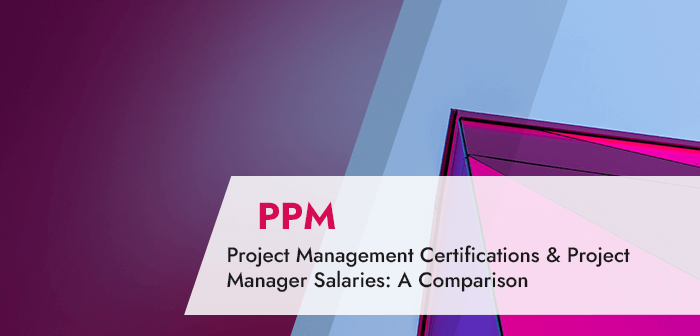Project management certifications are no longer unusual or a rarity. They are, in fact, becoming an essential part of any career plan and have a direct impact on project manager salaries.
Employers and clients view project management certifications as a sign of professionalism. Job ads and requests for bids often specifically require these certifications. The importance of the individual certifications varies along with their value and impact on salaries.
This article takes a brief look at the meaningfulness of PM certifications and what they are expected to provide. We’ll then compare the most important project management certifications. Finally, we’ll take a look at how these certifications affect a project manager’s salary.
Let’s start with an overview of the chapters.
- Project management certifications: the expectations
- A comparison of the most important project management certifications
- A comparison of project manager salaries
- Conclusion
Project management certifications: the expectations
Let’s be honest: If certification has no quantifiable benefit, what’s the sense in getting one? However, many of the benefits ‒ such as reputation and the prestige of being recognized as an expert ‒ aren’t quantifiable. Both of these are, of course, good reasons for making the effort to become certified as a project management professional.
In the end, however, what you really want is a document certifying your qualifications and a project manager salary commensurate with these qualifications.
The easiest factor to measure is therefore: money.
What types of certification are expected for the various project manager roles?
- Project managers for internal projects:These PMs hope for a better standing than those involved in line functions and expect projects to be handled more effectively and efficiently.
- Project managers for projects in which substantial parts are outsourced:These PMs strive to been seen as possessing greater expertise than the contractors and possible subcontractors. They also hope to be treated as a VIP client as a result of this expertise.
- Project managers for client projectsThese PMs hope that the certifications will pave the way to attractive projects at a lower cost. Often, all that really matters is fulfilling the client’s bid request requirement to have a certified project manager.
This third expectation is clearly about the hope of generating more income from the project business. The first two expectations are more difficult to ascertain.
In all three scenarios, however, we can assume that the expectations and their fulfillment are reflected in the project manager salaries. After all, there are costs associated with achieving project manager certification.
Before we take a look at the issue of increasing income through project manager certifications, however, let’s examine the most important ones of these.
A comparison of the most important project management certifications
The number of project management certifications available is almost overwhelming. However, there are a few favorites with regard to name recognition and prevalence.
In this section, we’ll examine the most well-known and important certifications for project managers. We’ll provide recommendations for the budget needed to prepare for, and take, the relevant examinations.
The budget is based on our knowledge along with information given by each provider and the experiences of our customers. The budget amounts have been rounded up to the nearest hundred or thousand euros and don’t include travel expenses. Note that this information is provided without guarantee.
Project Management Professional (PMP®)

Certification as a Project Management Professional® (PMP) is provided by PMI®, the U.S.-based Project Management Institute.
There are now over 1 Million PMP-certified individuals worldwide.
To be admitted to the certification exam, you must have:
- 36 months / 4,500 hours of project management experience for candidates having a bachelor’s degree -or-
- 60 months / 7,500 hours of project management experience for applicants having only the equivalent of a high school diploma (in Germany, the requirement is a diploma from a university of applied science).
Also required are 35 “Contact Hours of Project Management Education”. Most candidates gather these hours as part of a 5-day PMP preparation seminar to help applicants prepare for the PMP exam. (Here you’ll find more information about the PMP prerequisites for certification.)
Learn about the PMBOK Guide Seventh Edition – the basis of the PMP exam.
The PMP examination process: The exam is a computerized test with primarily situational questions. The test consists of 200 questions that must be answered within four hours.
A computerized test has the advantage of having an international focus. The exam is the same worldwide, and using the same terminology and having a shared understanding of the processes and methods makes it easier to work with colleagues overseas.
Another advantage is that you don’t need an appointment with the examiners, but rather can simply choose the most convenient date and test center.
In Germany, the PMP certification exam is offered at four test centers, which are located in Berlin, Frankfurt, Hamburg, and Munich.
German translations of the source documents and the PMP certification exam itself are available so that even those without a perfect command of English can take the exam.
Budget: € 2,800*
Are you interested in obtaining PMP certification? PMP seminars to help you prepare for the exam are available here.
Certified Associate in Project Management (CAPM®)
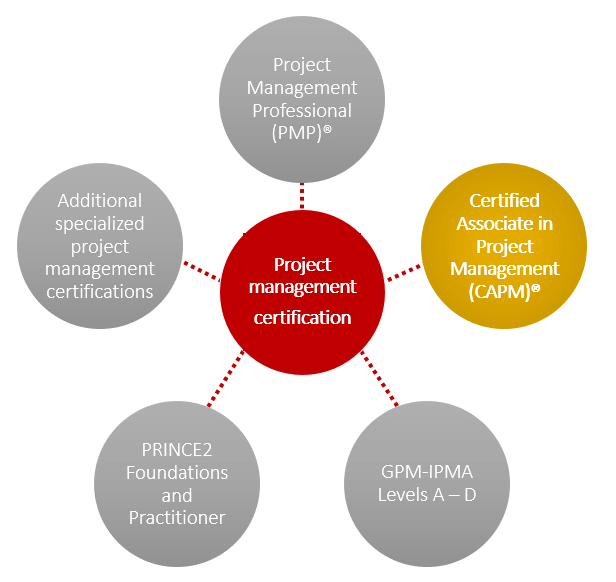
CAPM is an entry-level certification for project management that is also provided by PMI.
As a prerequisite, it requires either 1,500 hours of project management experience or 23 “Contact Hours of Project Management Education”, making it suitable to project management beginners as well.
Many CAPM candidates attend a PMP exam preparation seminar to prepare for this. This preparation is somewhat too broad in scope but still applicable. It fulfills the “35 Contact Hours” requirement for later advancement to the PMP exam.
The CAPM exam is also a computerized test. There are more test centers for the CAPM exam than for PMP.
Budget: € 300 to € 2,500*
GPM-IPMA Levels A – D
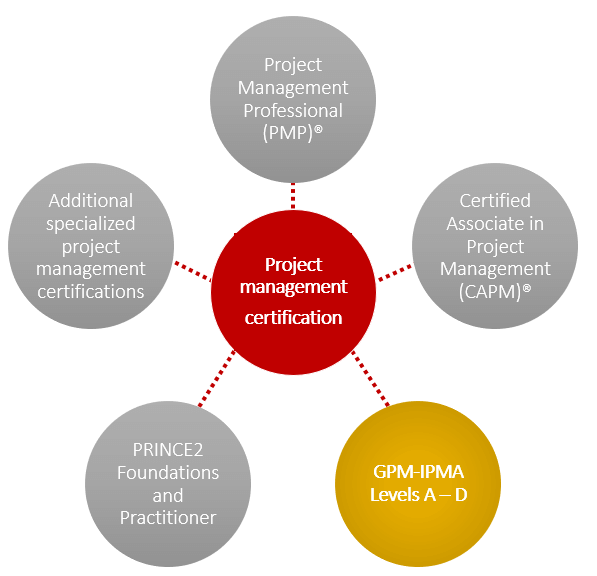
These certifications are issued by the German project management association “Gesellschaft für Projektmanagement” (GPM).
GPM is a member of the industry association IPMA (International Project Management Association), and its certifications are aligned with certifications issued by the respective national associations and mutually recognized by these.
The most popular GPM certification is the Level-D certification.
Successfully passing the Level-D exam entitles a candidate to call themself a “Zertifizierte(r) Projektmanagement-Fachmann/-frau” (Certified Project Management Associate).
The IPMA refers to this certification as “Certified Project Management Associate”.
The exam consists of an oral and written exam that includes an essay. It is administered by GPM examiners in Nuremberg, but can also be held at a company site if there are sufficient candidates and the company supports this effort.
Budget: € 4,700*
PRINCE2 Foundations and Practitioner
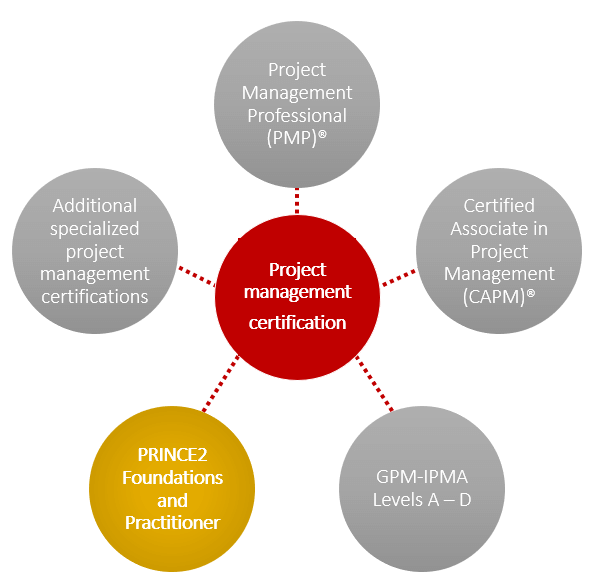
These two certifications are issued by the company Axelos, in which the British government is a partner. The exam confirms knowledge of a specific PRINCE2 methodology.
This expertise is especially useful in organizations employing this methodology. The minimal requirements with regard to training and experience along with the low cost have made this a very popular option.
Budget: € 200*
Additional project management certifications

There are additional project management certifications specifically designed for particular aspects of project management such as:
- Agile methods (for example: Professional Scrum Master I)
- Risk management
- Scheduling
Note: This article answers the question “Why is agile certification important?“
Six Sigma certifications are also discussed here. The focus is on having a process for applying project management in quality improvement projects.
Or certification related to the V-model or V-model XT. These models are basically the German equivalent to PRINCE2 but have not gained the same level of popularity.
A comparison of project manager salaries
Now let’s get to the crucial question: What effect do project management certifications have on a project manager’s salary? Industry associations regularly publish salary reports such as these here:
- Salaries in Germany are found in the Salary Survey by the Project Management Institute (PMI) for 2020
- Salary Survey (in German) of the deutschen Gesellschaft für Projektmanagement (GPM) dated 2017
Please keep in mind that these salaries are also greatly influenced by factors other than certification. Other important factors:
- The person’s level of experience
- The person’s level of education
- Type of industry
- Gender (unfortunately!)
A certification intended for beginners is therefore given less weight in a salary survey although it can actually have a greater impact on the salary.
“One can generally assume that a comparison of the incomes of people with a certification to those without one is a meaningful indicator.”
PMI Salary Survey (2020)
The effect of these “years of service” is clearly recognizable in the Salary Survey by the Project Management Institute (PMI). It lists only figures for those possessing PMP certification (Project Management Professional).
People who recently received their PMP certification (bar at left) actually reported lower project manager salaries than those who were not certified. However, the longer these PMPs have been certified the more their salaries rise to significantly exceed those of non-PMPs.
Among those surveyed, people with PMP certification reported an average of 14.6% more income than those lacking this certification.
One could argue, of course, that it’s in PMI’s own business interest to shed the best light possible on its own certification. So, let’s take a look at the data presented by another industry association: the German project management association “Gesellschaft für Projektmanagement” (GPM).
GPM Salary Survey (2017)
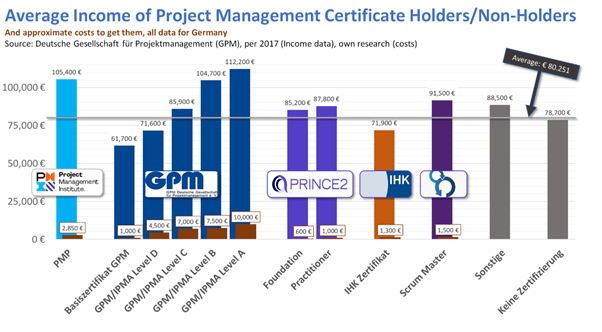
The study uses figures from 2017. An updated version has been announced for 2020.
The Deutsche Gesellschaft für Projektmanagement (GPM), a member of the international industry association IPMA, is a competitor of the PMI and has therefore no incentive to embellish these figures. So we can assume that the numbers are very reliable.
Clearly discernible is that:
- The added value of a PMP certification is significantly higher than indicated in PMI’s own study. PMP-certified people earn an average of 33.9% more than those without this certification.
- Both studies show very similar incomes for non-certified people: € 78,700 in the GPM survey vs. € 77,443 in the PMI survey.
- However, the two studies greatly diverge when it comes to the average salaries of those who are PMP-certified: € 105.400 in the GPM survey vs. € 88.826 in the PMI one (see figure 1).
Only those possessing GPM/IPMA-Level A certification earn on average more than those with PMP certification. This certification is, however, more difficult to obtain and also more expensive. These factors seem to have the effect of significantly enhancing the incomes of those who have this certification.
Summary
Project management certifications send a signal to employers and clients that this person has spent considerable time working in project management and views this field as an important part of their professional career.
The GPM study and PMI’s international survey show that project management certification generally increases incomes by approx. 14-34%). The enhanced value is also reflected with employers and clients.
However, project managers will find that certification is no substitute for intensive professional experience dealing with real-life situations. This experience is essential. The two studies mentioned above confirm that a project management certification is no substitute for practical experience.
Our final tips
Get to know the individually adaptable “PPM Paradise” – the optimal environment for your enterprise-wide project, program, portfolio and resource management. Download the eBook now (just click, no form).
And sign up for our bi-weekly blog newsletter to make sure you receive all our updates.
What PM certifications do you have, and what has been your experience with these? How do you view the correlation between certification and salary? Please leave us a comment.
* All figures provided are based on research conducted in 2020 and are provided without any guarantee or liability.
Subscribe to TPG BlogInfo: Never miss new practice-oriented tips & tricks
Every other week: Receive practical tips in TPG blog posts written by recognized experts in project, portfolio, and resource management.
* Required Fields | Data Protection
 About the author: Oliver F. Lehmann, MSc, ACE, PMP is a trainer for project management and project business management. He is renowned as an author of reference books and articles and as an analyst for critical projects. For over ten years, he was actively involved in project management before becoming a trainer in 1995. Today he serves a global audience, focusing on the certification of individuals and improving the project business. He is President of the Project Business Foundation and a long-serving volunteer at PMI, the Project Management Institute.
About the author: Oliver F. Lehmann, MSc, ACE, PMP is a trainer for project management and project business management. He is renowned as an author of reference books and articles and as an analyst for critical projects. For over ten years, he was actively involved in project management before becoming a trainer in 1995. Today he serves a global audience, focusing on the certification of individuals and improving the project business. He is President of the Project Business Foundation and a long-serving volunteer at PMI, the Project Management Institute.
You can read more about Oliver F. Lehmann on LinkedIn and XING.


